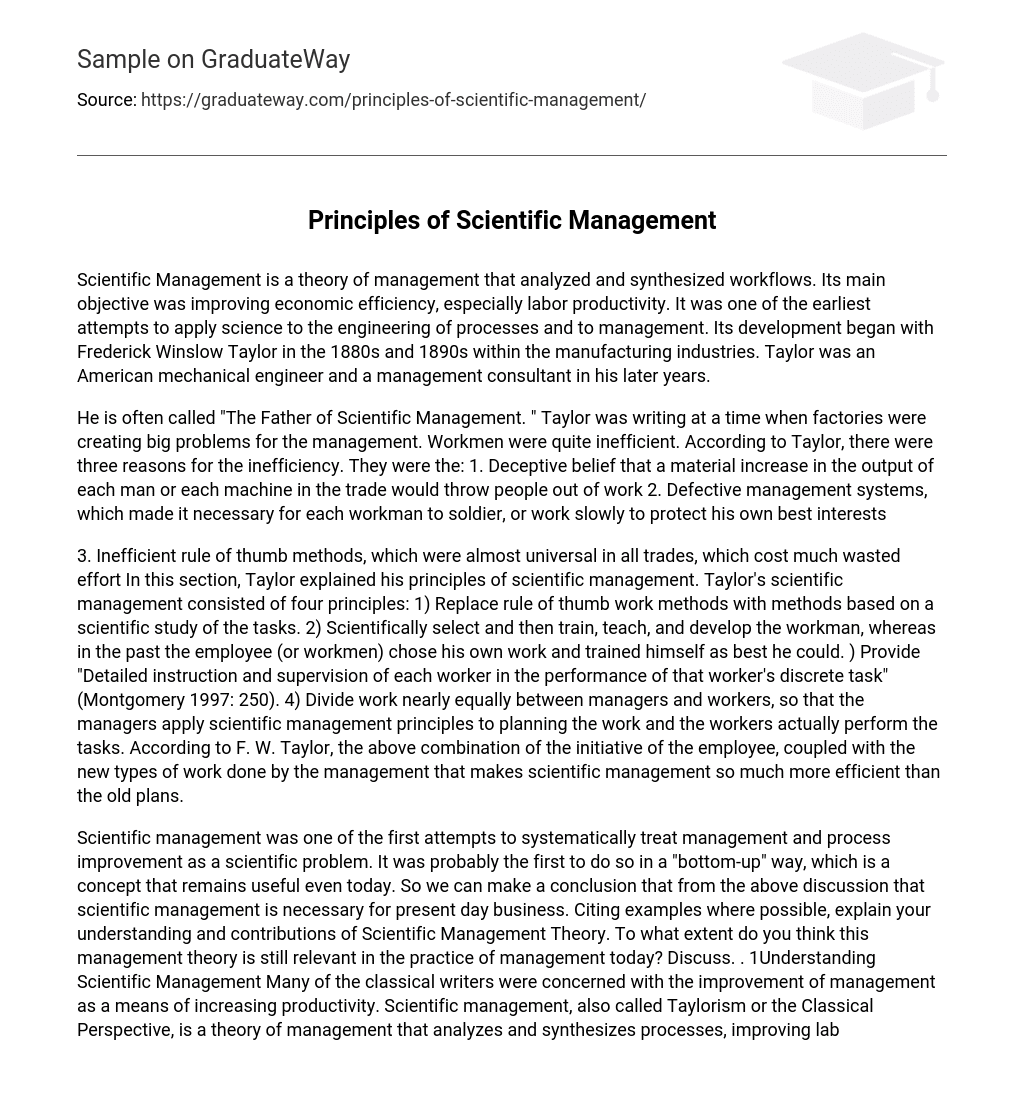Scientific Management, which commenced in the late 19th century, aimed to enhance economic efficiency, particularly labor productivity. It was an early effort to blend scientific principles with process engineering and management. Frederick Winslow Taylor, an American mechanical engineer and later a management consultant, pioneered its development in the manufacturing sector.
He is frequently referred to as “The Father of Scientific Management.” Taylor wrote during a period when factories posed significant challenges for management. The workers were considerably inefficient based on Taylor’s analysis, which identified three causes for this inefficiency. These reasons were: 1. The misconception that a substantial increase in individual or machine productivity within the industry would result in unemployment 2. Faulty management systems that compelled workers to engage in “soldiering,” or intentionally working slowly to safeguard their own interests.
3. Taylor explained his principles of scientific management in this section. The principles consisted of: 1) Replacing rule of thumb methods with scientifically studied methods. 2) Selecting and training workers scientifically, instead of allowing them to choose and train themselves. 3) Providing detailed instruction and supervision for each worker’s task. 4) Dividing work equally between managers and workers. Taylor believed that this combination of employee initiative and management’s new approach makes scientific management more efficient than old methods (Montgomery 1997: 250).
Scientific management, also known as Taylorism or the Classical Perspective, was one of the first attempts to approach management and process improvement as a scientific problem. It took a “bottom-up” approach, making it a concept still relevant today. From the above discussion, it can be concluded that scientific management is necessary for modern businesses. This theory, developed by Frederick Winslow Taylor in the late 19th century, aimed to enhance labor productivity by analyzing and synthesizing processes. Taylor advocated for replacing traditional decision-making with precise procedures established through careful study of individuals at work.
According to Taylor, all work processes could be analyzed into separate tasks. By using the scientific method, it was believed that the best way to perform each task could be identified. Each job was divided into smaller parts and the timing of each part was measured. These parts were then rearranged to create the most efficient method of working. In current management literature, the concept of Taylorism is often used as a comparison to a newer and more improved way of conducting business. 1. 2Scientific Management Theory Taylor supported the idea that motivation is driven by rational-economic needs.
He believed that if management acted on his ideas, work would become more satisfying and profitable for all concerned. Workers would be motivated by obtaining the highest possible wages through working in the most efficient and productive way. He set out four principles to guide management. These principles are usually summarized as: The development of a true science for each person’s work. This principle created by Taylor does replace the old rule-of-thumb method. The scientific selection, training and development of the workers, whereas in he past he chose his own work and trained him as best he could. Co-operation with the workers to ensure work is carried out in the prescribed way which has been developed. The division of work and responsibility between management and the workers. The management takes over all work for which they are better fitted than the workmen, while in the past almost all of the work and the greater part of the responsibility were thrown upon the men. These principles were implemented in many factories, often increasing productivity.
Henry Ford implemented Taylor’s principles to enhance efficiency in his automobile factories, which greatly influenced the success of McDonald’s. The key factors behind the triumph of McDonald’s, such as the ability to handle large volumes and minimize wait times for customers, as well as maintaining consistency and predictability in their end products, are all rooted in the principles of Scientific Management. The concept of “McDonalization” encompasses the evolution of these core principles. Furthermore, by analyzing the intersections between strategic management and scientific management, one can gain insights into the potential trade-offs involved.
The implementation of assembly line techniques has allowed McDonald’s to efficiently serve large quantities of food. Taylor’s approach to human behavior focused on pragmatism and the use of standardized work procedures. Employees were seen as rational, economic individuals who were primarily motivated by monetary rewards tied to their level of productivity. They were treated as separate entities rather than members of a team, resembling units of production that were managed similarly to machines. Consequently, scientific management is commonly referred to as a model rooted in the theory of machines.
Despite Taylor’s work facing criticism in modern times, it is important to remember that he wrote during a period of industrial reorganization and the rise of large, intricate organizations implementing innovative technology. Taylor’s primary focus was on enhancing the efficiency of both the workforce and management. He held a belief that his scientific management methods would result in increased industrial efficiency and prosperity. However, in reviewing numerous human resource books, I personally conclude that although these principles improved productivity and significantly influenced the industry, they also heightened the monotony of work.
The essential elements of skill variety, task identity, task significance, autonomy, and feedback were absent from the principles of scientific management. Although workers generally accepted the new methods of work, there were instances where they did not. The implementation of stopwatches often sparked protests and resulted in a strike at a factory where Taylorism was put to the test. Because of complaints about the dehumanizing nature of Taylorism, an investigation by the United States Congress was initiated. Regardless of its controversial nature, scientific management revolutionized work practices and is still utilized in various forms today.





